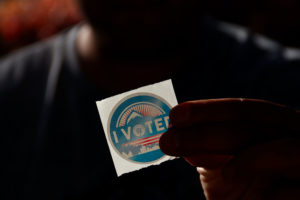Supporting Future Generations of Voters
 Photo by Manny Becerra on Unsplash
Photo by Manny Becerra on Unsplash According to Vote.org, there are an estimated eight million newly eligible voters since the last election cycle and eighty-nine percent of young people indicate they might vote. In their recent get-out-the-vote webinar, they shared research by the Harvard Institute of Politics that “confirms that deadline reminders, voting guides, how-to training, and conversations with friends and family are all helpful turnout tactics.” Here are some examples of how secular and humanist organizations are supporting young voters and future voters, and how we can help.
Camp 42 and Camp Quest are emphasizing voter registration with their staff and teen Leaders in Training, plus encouraging teens to set up voting registration drives at their schools when they return next fall. For younger campers, summer programming and year-round engagement focuses on learning about their connections to each other, the environment, and the world and how children of all ages can have a positive impact. Camp counselors aim to help shape campers’ thinking when it comes to making decisions, taking action, and viewing the actions of those in positions of leadership like political candidates.
“As humanists, we believe that we are responsible for our actions and our lives and that it is up to us to make a positive difference in this world,” said Camp 42 Executive Director Amy Monsky. “One of the ways we encourage campers to understand that they can be powerful agents of change in their own lives and their community is by talking about civic duties. We have run several different programs in the past that focus on their rights, including the history of the Pledge of Allegiance, what their rights are as students, and what to do if their rights are violated.” Camp Quest Executive Director Alyssa Fuller shared that she’s inspired and amazed by campers’ advocacy work on various issues and hopes older generations will listen and join them.
Encampment for Citizenship (EFC) summer intensives provide fifteen-eighteen-year-olds with a multicultural democratic community and a grounding in basic skills to develop into informed and responsible activists. In July, EFC will meet in Montgomery, Alabama, where young Encampers will learn about the local community’s struggle for fair housing, equity in education, clean water access, voting rights, and resistance to Jim Crow. (Applications for 2024 are due by March 15). With help from guest experts, museums, and community organizers, they will analyze strategies from the Civil Rights Movement and discuss how we can find inspiration to battle current attacks on civil rights. EFC also provides year-round programming, connecting older alums with recent ones in an intergenerational network.
EFC was founded in 1946 by Algernon D. Black, a leader of the New York Society for Ethical Culture, and Alice K. Pollitzer, a prominent civic leader, on the core idea that young people can be a positive force in their communities if they develop critical thinking skills, youth activism, leadership qualities, and the courage to work for social justice. Deanna Marie Mousseau, a member of the Pine Ridge Reservation in South Dakota, was an Encamper in 2015 and 2016 before being an intern in 2017. She greatly valued the lessons she learned about the power of knowledge, strength in numbers, and influence of one’s voice. “My ambitions got bigger and I really started to realize what I am capable of. A big thing I learned was how to be a truth seeker. My summers spent with the Encampment were always ones of correcting false history or assumptions, to gain a better understanding of the social sphere I live in today.”
Secular Student Alliance recently hosted an excellent webinar with panelists from Campus Takeover and Voters Not Politicians on Voting Rights and Access. Speakers emphasized the need for students to get appropriate identification in order to register, how to obtain and understand ballot details, find polling or ballot drop-off locations, and support their peers in doing the same. They reminded students that elections and their impacts take place at every level of government, so they shouldn’t let frustrations with national campaigns discourage folks from being active locally. And they highlighted upcoming civic days such as National Voter Registration Day (September 17), National Voter Education Week (October), Vote Early Day (October 29), and Election Hero Day (November 6). All are great opportunities to engage new and returning voters this election year.
Through providing resources with the Secular America Votes program, the Secular Coalition for America, American Atheists, American Humanist Association, Center for Inquiry, Freedom from Religion Foundation, and Secular Student Alliance aim to embolden activists to become voting advocates. SCA’s Communications Manager Nnenna Onwukwe reminds us that “it’s more important than ever this year to get out and vote; by sharing voting information, encouraging others to vote in local and national elections, and helping others get registered to vote, we can make sure our secular rights are upheld.”
